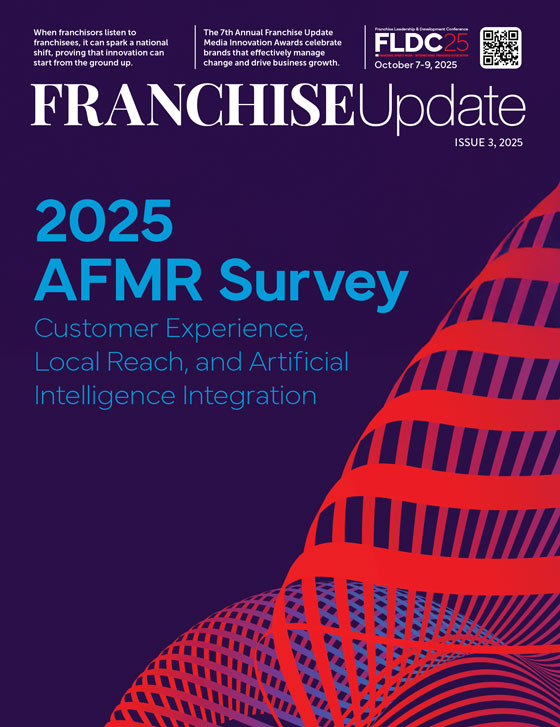Listen Up, Franchisors! Your Best Ideas Might Come from the Front Lines

As soon as AtWork COO Jason Leverant heard the idea, he knew franchisee Gregg Hassler was onto something—possibly something big.
In the competitive staffing industry, which connects companies that need employees with people who need jobs, brands are always looking for a way to get an edge over rivals. Hassler thought he knew how.
Though much of the staffing business involves providing temporary workers to companies, staffing brands also specialize in finding candidates for permanent positions. Those recommendations usually come with a limited guarantee. Hassler’s idea was this: Instead of just offering the typical 30-day, full-refund guarantee if a hired candidate quits or doesn’t work out and the 90-day, free-replacement guarantee, AtWork should be bolder. He proposed to the brand that it roll out an eye-popping seven-year replacement guarantee.
“Offering a guarantee is one thing, but offering a seven-year guarantee is a whole other story,” Leverant says. “Because it’s so extraordinarily longer than your traditional guarantees that we see from anyone else in the industry, it immediately positioned us as more competitive, more aggressive.”
The Secure 7 Guarantee was introduced in Southern California. It was such a success that the initiative was expanded. “We’ve woven it into our core messaging as an organization to help differentiate our direct-hire practice,” Leverant says.
The story of the origin of AtWork’s Secure 7 Guarantee reinforces what many of the best franchise systems already know: Franchisees aren’t just implementers; they’re often innovators. The insights they provide, including ways to improve products, services, processes, marketing, tools, and tech, can make franchisors stronger.
Franchisors must maintain brand control and consistency, but it’s also important to listen to the voices coming from ground level.
“This is a true partnership,” says Theo Camurca, vice president of operations at Firehouse Subs. “Franchisors and franchisees rely on each other to succeed. Our job is to support them, helping them run great restaurants and stay profitable. Their input helps us make better decisions and evolve the brand in ways that work in the real world.”
Firehouse Subs listened when Scott Anthony, a multi-unit franchisee based in Orlando, Florida, pushed the idea of adding french fries to the menu. Because of the competitive pressure at his Orlando mall location, Anthony felt the addition would enhance his business. It did. The brand decided to add fries to its menu nationwide this year.
Brand leaders at Firehouse Subs want feedback and ideas from franchisees, so they’ve created channels to receive them, Camurca says.
“Franchisees are in the restaurant every day, serving guests and seeing firsthand what works and what could be better. Their perspective is incredibly valuable,” he says. “We’ve built several ways for them to share feedback, like monthly webcasts with the leadership team, quarterly committee meetings, and board sessions where they’re encouraged to bring ideas forward.”
Outside of the box
Every year, when Franchise Business Review conducts its survey of franchise owners and asks them to rate their experience and level of satisfaction, Leverant and other AtWork leaders pore over the results.
“We take the feedback and details found in the FBR to really road map our development schedules. In our minds, we’re in a state of perpetual development based on that feedback. We consistently look in the mirror and say, ‘How can we do that better?’” Leverant says. “We keep a good sense of what’s going on in the staffing industry. But at the end of the day, the voice of the owner is really what matters.”
Staffing agencies’ fees for their recruitment and placement of a permanent employee are typically a percentage of the hired candidate’s first-year salary. The Secure 7 Guarantee would require companies to pay a higher percentage. But if the employee leaves before the seven-year timeframe, fees for finding the replacement candidate would be reduced by 50%.
Hassler’s idea was brilliant for several reasons. There was the “shock and awe” factor, Leverant says. It also almost guarantees the company will return to AtWork if the candidate needs to be replaced.
AtWork has seen a “massive pickup” in its direct-hire business, Leverant says. “This surety over an extended period of time has done wonders.”
Hassler and his business partner, Moses Rangel, have long been regarded by their fellow franchisees as innovators. That reputation has only grown since the implementation of Secure 7.
The brand makes sure that its franchisee-innovators are recognized as such, Leverant says. Other AtWork franchisees have brought ideas that have also been widely adopted.
Reliable transportation can be a persistent issue for temp workers, Leverant says. “Many times, the employees that we work with, they have varying backgrounds and varying resources. We set up screeners for things like reliable transportation,” he says. “But at times, life happens. The statistics are actually quite high where somebody’s employment is interrupted because of an issue with transportation.”
Multi-unit franchisee Josee Minero came up with the idea for Ride Rescue. If a worker is in a bind with no way to get to the job, they can use a rideshare service and charge it to an AtWork account. The cost is deducted from the employee’s paycheck.
“They don’t have to worry about fronting that money or getting an account,” Leverant says. “We coordinate and fund the ride for them and give them that opportunity to get to work on time or to get home.”
AtWork franchisees aren’t required to offer the service, but it’s helpful to workers if they do. Leverant says it’s a great idea, and it’s “relatively simple in nature but really impactful to the day-to-day lives of our associates.”
$15,000 call
For any business that provides a service, it’s important that the first contact with a potential customer is skillfully handled. It’s especially important when that customer is seeking information on in-home care services for their loved ones, says Dani Sloan, franchise operations coach for A Place At Home, which provides nonmedical assistance to the elderly and those with health issues.
“A lot of times, families are in panic mode when they’re calling for services, and so they need those details right away,” Sloan says. “A lot of times, they need to start care within 24, 48 hours. So, if you can’t answer those questions, they’re moving on to a different agency.”
The urgency is real. Family members have loved ones who are “coming out of rehab, because they had a fall. Or they’re in a hospital coming home. Or maybe they’re at the end of their life, and they’re in hospice,” Sloan says. “Maybe a family lives out of town, and they just happen to come in during a holiday and notice that Dad can’t upkeep the house, and Dad’s not making it to doctor’s appointments or taking his medication when he’s supposed to, or he’s not bathing, or he’s not eating very good meals, or he’s just forgetting to eat completely. That’s when we get those fast turnaround times.”
The person who answers calls from families in those situations needs to be able to fully address callers’ concerns and be able to ask relevant questions. That’s one of the reasons that an idea from Nebraska franchisee Rick Perkins was so well received.
Perkins, who owns two A Place AT Home franchise operations with his wife, Kris, conceived the idea after attending a webinar that wasn’t related to home-care services but offered recommendations that A Place At Home could benefit from. In the webinar, it was stressed “how important that initial conversation is,” Sloan says.
Perkins created what he named the “$15,000 Inquiry Call Template,” a guide for franchise owners or office staff to be able to talk with prospective clients and gather all the necessary information. Six years ago, the name was derived from the average amount franchisees stood to make off each client who used A Place At Home services.
“Any person who’s answering your business phone should be able to take a prospect call, gather all of the important details from family members, and have those conversations about the services that we would provide to them and then book a meeting, hopefully, in that same call,” Sloan says.
It’s become an important tool that the brand has passed along to all its 46 franchisees. “Everyone loved it. Their office staff also appreciates it. Because if you’ve not ever been in a sales position or never been in the healthcare field or the home-care realm, you don’t know what questions to ask,” Sloan says. “That sheet is a really good guide on the important questions that need to be asked in order to provide appropriate services and appropriate pricing to families.”
Input from franchisees is key to A Place At Home’s success, she says. Its franchise advisory council plays an integral role in decision-making. Regular feedback sessions are also held with franchisees. “They’re vital in shaping the future of our brand,” Sloan says. “Their ideas and insights and experiences influence how we can be innovative and grow and serve our communities better.”
Pacers for the win
Few sports fans outside of the state of Indiana would’ve predicted that the state’s NBA team would play for the national championship in 2025. At the beginning of the season, betting odds put the Indiana Pacers’ chance of reaching the finals as high as 80–1.
It’s a good thing that Penn Station East Coast Subs’ multi-unit franchisee Joe Sunderman was inside the state of Indiana. Whether it was his basketball knowledge or just good timing, Sunderman’s idea to partner with the Pacers for a season-long promotion proved prescient.
“Joe came to us with the proposal to say that he would co-fund the Pacers sponsorship if we partnered with him on it, and we felt like it was a good opportunity,” says Senior Vice President of Marketing Jane McPherson. “Anytime the Pacers won, you could text in a keyword and get a promo code sent back to you that you could use at any of the Indiana Penn Stations for a buy-one-get-one-free on the day following a win.”
Sunderman didn’t just offer an idea. He took ownership of the project, working out the details with the NBA team and coming into Penn Station’s corporate office in Cincinnati to fine-tune the rollout.
“Joe really put the entire sponsorship together through his relationships,” McPherson says. “He grew up around basketball and has deep relationships in the professional and college basketball community. But also, he has this deep knowledge of Penn Station and partnered with us on how to make it all happen in terms of how to make the technology work.”
The Pacers fell short, losing in Game 7 to the Oklahoma City Thunder. But the campaign was a winner. Participating restaurants initially saw a 5% to 8% lift and, as the season went on, 10% to 12%.
“Not only did it drive traffic, but it also required someone to bring a friend. That gave us an opportunity to introduce new customers to the brand,” McPherson says.
Penn Station, a 40-year-old company with 325 locations primarily in the Midwest, developed similar partnerships across the franchise system. Of the 20 new initiatives rolled out by Penn Station last year, 18 came from suggestions from franchise owners.
The brand has a very active franchise advisory council. The advice and opinions received from franchisees are invaluable, McPherson says.
“We just reinvented our tech stack, and that was done in coordination with a franchise owner tech committee, which was very instrumental in helping us create the framework and also test technology solutions before we rolled them out to the system,” McPherson says. “We really are incredibly indebted to them because without that kind of working relationship, we would not be as efficient as we are or as effective.”
Franchise operators appreciate the brand’s responsiveness. This year, Franchise Business Review named Penn Station as one of the brands with the best company culture. Last year, it was named by FBR as one of the most profitable franchises and received an award for top franchise satisfaction.
“We really grew up as a very operationally-driven company,” McPherson says. “The entire framework and support system is geared toward franchise owner processes and operational support and really focused on driving profitability. So, that kind of culture is a really great fit for entrepreneurs.”
Share this Feature
Recommended Reading:
| ADVERTISE | SPONSORED CONTENT |
FRANCHISE TOPICS
- Multi-Unit Franchising
- Get Started in Franchising
- Franchise Growth
- Franchise Operations
- Open New Units
- Franchise Leadership
- Franchise Marketing
- Technology
- Franchise Law
- Franchise Awards
- Franchise Rankings
- Franchise Trends
- Franchise Development
- Featured Franchise Stories
FEATURED IN

Franchise Update Magazine: Issue 3, 2025
| ADVERTISE | SPONSORED CONTENT |








 The franchise listed above are not related to or endorsed by Franchise Update or Franchise Update Media Group. We are not engaged in, supporting, or endorsing any specific franchise, business opportunity, company or individual. No statement in this site is to be construed as a recommendation. We encourage prospective franchise buyers to perform extensive due diligence when considering a franchise opportunity.
The franchise listed above are not related to or endorsed by Franchise Update or Franchise Update Media Group. We are not engaged in, supporting, or endorsing any specific franchise, business opportunity, company or individual. No statement in this site is to be construed as a recommendation. We encourage prospective franchise buyers to perform extensive due diligence when considering a franchise opportunity.